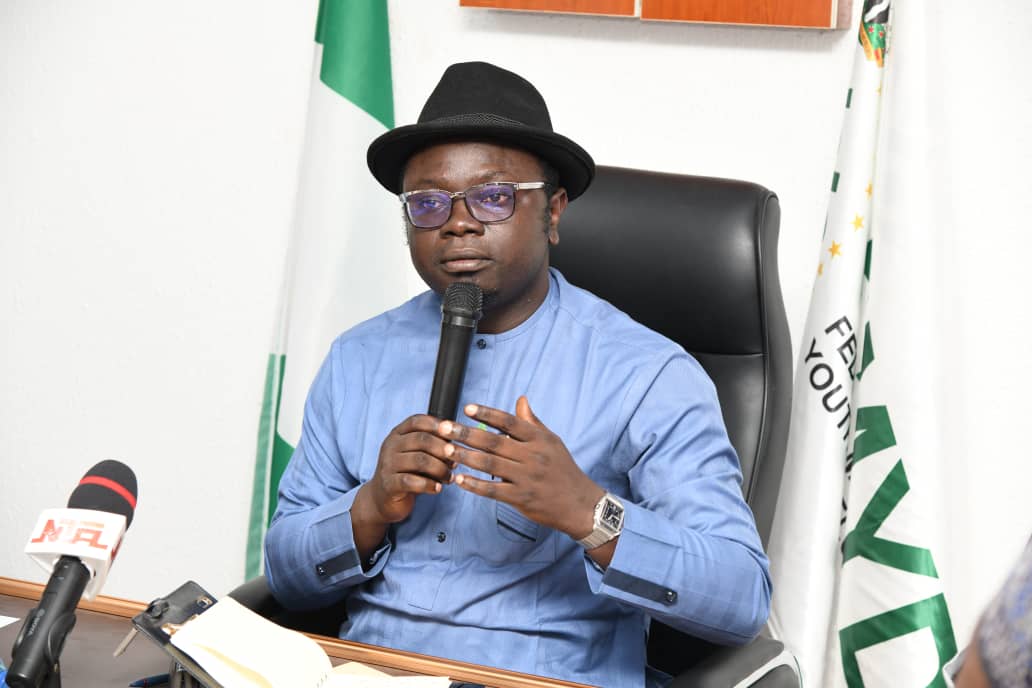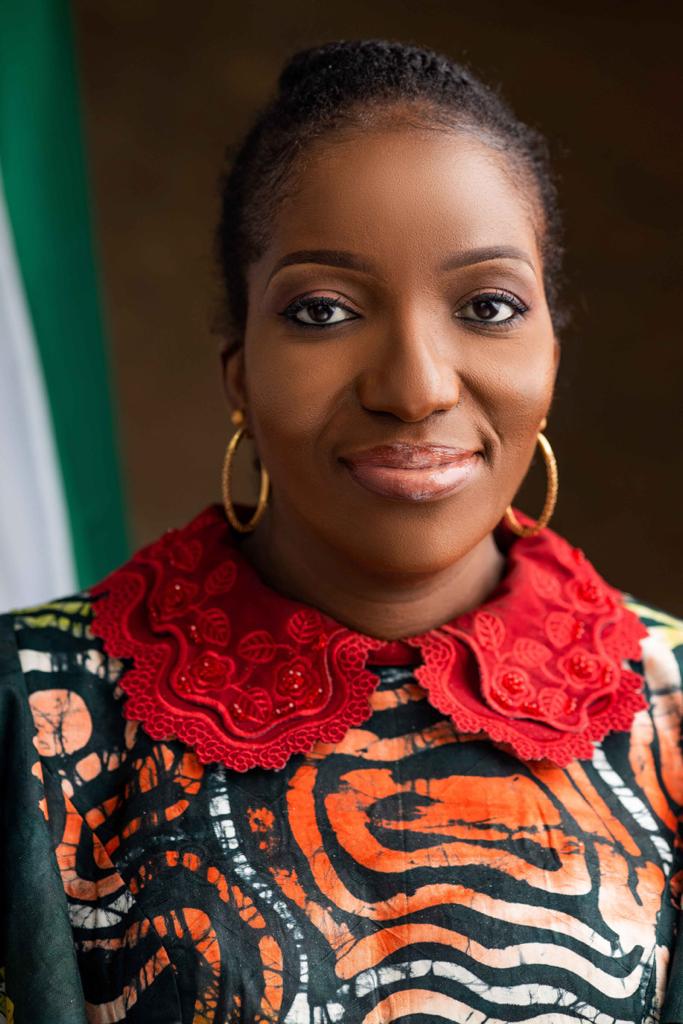Featured
FG to Harness the Digital Economy to Empower Youth

Joel Ajayi
The Honourable Minister of State for Youth Development, Mr Ayodele Olawande has disclosed that the Federal Government is making efforts to harness the potentials of the digital economy in empowering the youth and creating sustainable jobs.
He made this disclosure in Abuja when he received the participants of the Senior Executive Course 46, 2024 of the National Institute of Policy and Strategic Studies, (NIPSS), Kuru, Jos, Plateau State who were on study tour to the Ministry.
Mr Olawande said over 50% of the population below the age of 30 have a significant demographic advantage in the digital age.
“Our youths are tech-savvy, innovative and eager to contribute to the country’s economic growth. However, they face numerous challenges including limited access to quality education, skills training and job opportunities.
The digital economy offers a unique opportunity for Nigeria to leapfrog traditional development challenges. With the rise of e-commerce, digital payments and remote work”. “Our youths can assess global markets, skills training and job opportunities like never before,” he added.
According to the Minister, challenges hindering the growth of the digital economy in Nigeria must be addressed.
He explained that to overcome the challenges, the Ministry has implemented initiatives such as digital skills training programs for youths, focusing on areas like software development, data analytics and digital marketing especially in the NYSC.
This, he disclosed is alongside partnering with Galaxy Back Bone to improve infrastructure, Internet connectivity and alternative electricity supply as well as funding opportunities such as grants, loans and venture capital for startups of small businesses with launching of the National Youth Investment Fund.
The Honourable Minister who hinted that the Ministry’ s goal is to create an ecosystem that supports entrepreneurship and employment opportunities for youth stated: ” We recognise that sustainable job creation is critical to Nigeria ‘s economic growth and stability”
”I urge you all to join us in this journey to harness the potential of the digital economy for youth empowerment and sustainable job creation in Nigeria.”, he added.
Mr Olawande further said that the opportunities and challenges underscore the need for a collaborative effort from all stakeholders to harness the potential of the digital economy for sustainable development.
The Minister who observed that there is a gap between the Government and the young people expressed his heartfelt desire for the Youths of the nation to feel the Government. He opined that the country has the most intelligent youths in the world.
Earlier, the leader of the delegation from NIPSS, Barrister Nima Salman Mann, mni said they are in the Ministry to research, proffer solutions, recommendations and strategies to help Government chart its course for the the year, with the theme : ‘Digital Economy, Youth Empowerment and Sustainable Job Creation in Nigeria: Issues, Challenges and Opportunities’.
.She also added that Ministry of Youth Development is very germane to this year’s theme .” We are with the Ministry of Youth to listen to what you are doing to help the youth, how you are doing it, strategic plans and way forward as well as how we can use the digital economy to chart the goal for sustainable job creation,” she concluded.
Featured
NAPTIP Restates Commitment To Fighting Human Trafficking

Joel Ajayi
… decries corruption in law enforcement, weak legislation
The Director-General of the National Agency for the Prohibition of Trafficking in Persons (NAPTIP), Prof. Fatima Waziri-Azi, has pledged the agency’s commitment to fight human trafficking.
Waziri-Azi gave the assurance during an anti-corruption radio program, PUBLIC CONSCIENCE, produced by the Progressive Impact Organization for Community Development, PRIMORG, in Abuja.
The commitment by NAPTIP follows an investigative report by Human Angle Media exposing how many Nigerians trafficked to Egypt are inhumanely treated and exploited by their sponsors.
Represented by the agency’s Director of Public Enlightenment, Mrs. Kehinde Akomolafe, decried the rising number of Nigerians who are victims of trafficking, pledging that “NAPTIP is fighting on all sides to curb human trafficking.”
Akomolafe disclosed that the agency is aware of the report of Nigerians trafficked to Egypt and has already commenced interventions to rescue them while warning citizens to be wary of “offers that are too good to be true.”
She identified weak legislation, lengthy judicial processes, and corrupt law enforcement officials as factors aiding and abetting trafficking in Nigeria and elsewhere in the world.
“Corruption is endemic and cuts across other countries of the world, and that’s why trafficking is easily perpetrated in Nigeria and around the globe. You find law enforcement officials aiding and abetting traffickers. Some of them know these traffickers from their operations either at the entry or exit point. They give them something or become too familiar with them.
“Apart from the bribery aspect, we also have officials turning a blind eye to trafficking activities, and that’s why for us at the agency (NAPTIP), we are not resting.”
According to her, the agency, from inception, secured 672 convictions, 67 in 2023, and 35 persons so far this year (2024). She added that “NAPTIP is winning the war against trafficking but still wants stiffer punishment for traffickers and the support of the judiciary in hastening cases.
“weak legislation is aiding trafficking. That’s why the agency continues pushing for amendments. Currently, NAPTIP is pushing for stiffer punishment against traffickers that will lead to confiscation of their monies and property.
“NAPTIP Director-General (Prof. Fatima Waziri-Azi) is fighting on all sides against human trafficking.
“Where law enforcement officials are found complicit, NAPTIP Director-General does not take it lightly; she doesn’t compromise her anti-corruption stance even when a staff is involved,” Akomolafe stated.
According to the Editor of Southern Operations, Human Angle Media, Kabir Adejumo, many Nigerians trafficked to Egypt engage in forced labour. They are also living in fear as authorities go after illegal immigrants.
Adejumo said victims interviewed during the investigation are willing and interested in returning home, but their sponsors refuse to release their travel passports and threaten to implicate them.
He also revealed that the NAPTIP and Nigerians in Diaspora Commission (NIDCOM) are aware of the plight of Nigerians trafficked in Egypt and have currently rescued one person.
On her part, the Programme Manager of the Human Angle Foundation, Angela Umoro-David, expressed satisfaction at NAPTIP’s response to trafficking cases while urging the agency to stay on course with their mandate.
Umoro-David called on Nigerians to use a Freedom of Information platform (foi.humananglemedia.com) to help citizens navigate requests for public records from different government parastatals and agencies.
She stressed that the platform “is a website where people can submit their FOI requests to us (Human Angle), and we’ll submit it on their behalf to the particular agency. So we act as middlemen, connecting these government parastatals to the citizens”.
Public Conscience is a syndicated weekly anti-corruption radio program PRIMORG uses to draw government and citizens’ attention to corruption and integrity issues in Nigeria.
The program has the support of the MacArthur Foundation
-

 Featured5 years ago
Featured5 years agoLampard Names New Chelsea Manager
-

 Featured4 years ago
Featured4 years agoFG To Extends Lockdown In FCT, Lagos Ogun states For 7days
-

 Featured5 years ago
Featured5 years agoNYSC Dismisses Report Of DG’s Plan To Islamize Benue Orientation Camp
-

 Featured4 years ago
Featured4 years agoChildren Custody: Court Adjourns Mike Ezuruonye, Wife’s Case To April 7
-

 Featured3 years ago
Featured3 years agoTransfer Saga: How Mikel Obi Refused to compensate me After I Linked Him Worth $4m Deal In Kuwait SC – Okafor
-
Sports2 years ago
TINUBU LAMBAST DELE MOMODU
-

 News11 months ago
News11 months agoJubilation In Kaduna As Tribunal Upholds Ekene Adam Winner Of Reps Election
-
Featured5 years ago
Board urges FG to establish one-stop rehabilitation centres in 6 geopolitical zones
